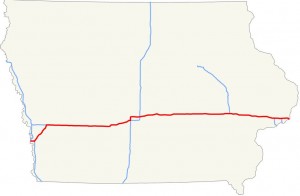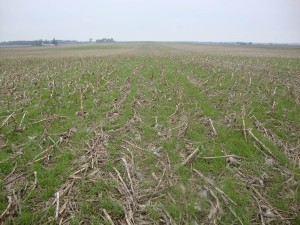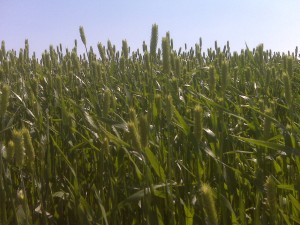
Sarah Carlson from Practical Farmers of Iowa reminded me that cover cropping north of I-80 is different than cover cropping in northern Indiana. She’s right. But how different is it, and why is it different?
Sarah is quoted in a very good article in Corn and Soybean Digest that helps explain the differences.
Several farmers in Wisconsin and northern Illinois are having cover crops aerial applied with good success. But I agree with Sarah; there are still challenges.
Cover Crop Challenges in the North

I see the following challenges to using cover crops North of I-80 after corn and soybeans:
- Shorter growing season after corn and soybean harvest
- The use of “full season” (for the region) soybean varieties and corn hybrids to maximize yield potential
- Fear using winter cereal rye (their best option after corn and beans) because of potential risks
- Fewer choices for cover crop species to use
- Harsh winters and less snowfall to protect smaller cover crop plants
Cover Crop Opportunities in the North
- More aerial applicators successfully flying on cover crops into standing corn and soybeans
- Improved yields following winter cereal rye, a crop that can be planted late
- High yields and profit with shorter season corn allowing timely application of cover crops
- Annual Ryegrass is working well in southern Wisconsin and southern Michigan and there are many positive results from using it.
- Dixie Crimson Clover has a good history of surviving the winter even in mid-Michigan and southern Wisconsin.
- Late planted Austrian Winter Peas are overwintering as far north as the top of the Thumb of Michigan.
- Winter Barley (winter hardy varieties) is surviving well in southern to mid-Wisconsin and in southern Minnesota and used for a cover crop or haylage before planting corn silage.
While not every producer North of I-80 will have success with cover crops after corn and soybeans, there are a number now that are happy with their results.
My message is to use wisdom and best management practices.
IF you want to try cover crops after corn and soybeans and you are north of I-80, realize that you are not the first person to try it. Many have gone before you with good results.
Don’t give up before you investigate the possibilities.
Now, if you are north of I-90…
